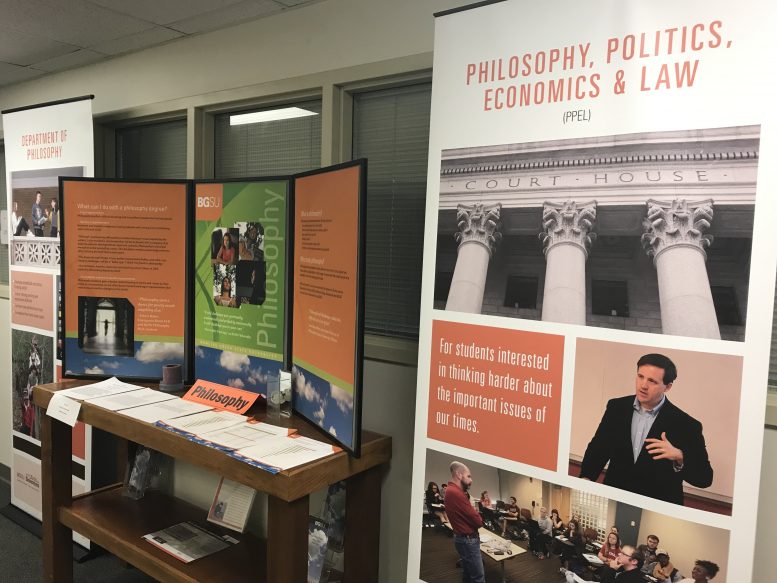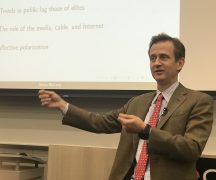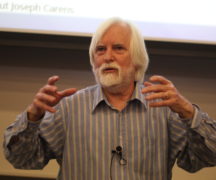By DAVID DUPONT
BG Independent News
Bowling Green State University officials see a $1.6 million grant from the Charles Koch Foundation as a way of growing the Philosophy, Politics, Economics, and Law major. And they feel the agreement they have signed with the foundation insures the university’s independence.
About $930,000 of the grant, which was announced two weeks ago, will be to hire two new tenure track faculty positions, one of which has been filled. A search will begin in fall for the second position. The remaining $660,000 will go in approximately equal parts to supporting the activities of the program director, two graduate fellowships, and other costs and expenses related to the program.
The foundation’s association with Charles and David Koch raised some concerns because of the brothers’ activism in promoting conservative and libertarian causes. A decade ago, the foundation’s funding for programming at Florida State University and George Mason University in Virginia led to national controversies, because of provisions giving the foundation a say in hiring.
Dean Raymond Craig said the agreement that BGSU has signed “does not have the same sort of hooks and problems.”
All hiring will be done, he said, according to the university’s hiring procedures for tenure track faculty.
Craig said that the foundation’s agreement with BGSU as well as its agreements with other institutions are all available at the Charles Koch Foundation website.
That agreement states: “(T)he Donor’s grant is intended to help promote a republic of science at the University where ideas can be exchanged freely and useful knowledge will benefit the well-being of individuals and society. Thus, the Parties agree that the academic freedom of the University, the Program, and their faculty, students, and staff is critical to the success of the Program’s research, scholarship, teaching, and service.”
The PPEL program started in 2015 as a minor, and became a major a year later. It now has 70 majors and pre-majors. “That’s excellent” for a new program, Craig said. He said he hopes the program increases to 75 by the end of the year,
These philosophy, politics and economics programs have their roots at Oxford University after World War I. The program was “designed to rebuild leadership in England.”
Kevin Vallier, the director of the program, said that BGSU added the law component. “because we feel we’re in a position to help students go to law school.” Still most programs are PPE.
The program is a way of continuing BGSU’s strong reputation in applied philosophy. Retirements and the relocation of a private center from the university because of those retirements lessened the presence of applied philosophy.
Vallier credited retired professor Fred Miller with the idea of PPEL as a way of fulfilling the interdisciplinary approach of applied ethics.
“PPEL’s main focus of bringing these disciplines together,” Vallier said. “We want to understand how our social world works and how it ought to work.”
Economics explains how the economy works, politics explains how the government works, and law how the legal system works. “Philosophy gives us the principles of moral rightness and good to help us to evaluate what’s going on,” he said.
Given the Charles Koch Foundation’s interest in liberty and human well-being and “promoting inquiry into those subjects,” the partnership makes sense “as a way to get PPE properly funded so we can offer a high quality major to the student body.”
This is not the first Koch money to come to BGSU, Vallier said.
There have been smaller grants dating back to the beginning of the program. Those helped launch the PPEL club, promote the program, and pay for speakers.
This year they made the decision to take the big step with a six-year grant, which would allow for hiring the two tenure track positions. Those positions will be in philosophy, which is the lead department in the program, Craig said.
Vallier said that the past problems with the foundation were over “something they almost never did,” and have now completely ceased doing.
The university will have “complete academic freedom,” he said.
While some people scoff at the notion of the value of studying philosophy, Craig said Forbes magazine found a “disproportionate” number of top chief executives in business have degrees in philosophy.
The interdisciplinary nature of the program, Craig said, “is an essential feature for students. They have to think about things from different perspectives, and that’s built into the fabric of the program.”





